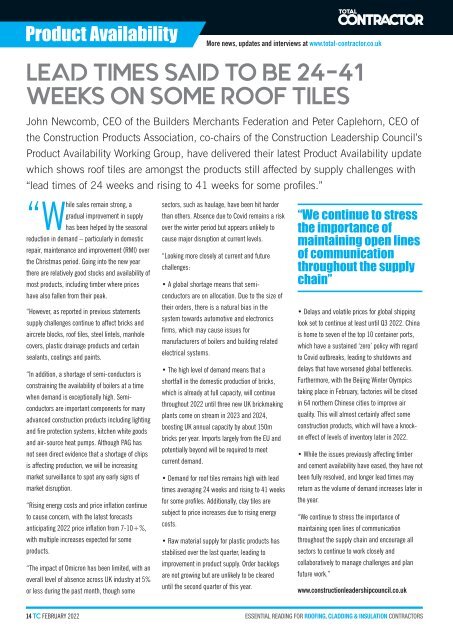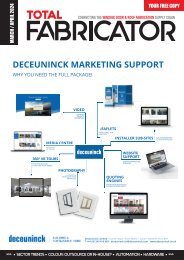February 2022
You also want an ePaper? Increase the reach of your titles
YUMPU automatically turns print PDFs into web optimized ePapers that Google loves.
Product Availability<br />
More news, updates and interviews at www.total-contractor.co.uk<br />
LEAD TIMES SAID TO BE 24-41<br />
WEEKS ON SOME ROOF TILES<br />
John Newcomb, CEO of the Builders Merchants Federation and Peter Caplehorn, CEO of<br />
the Construction Products Association, co-chairs of the Construction Leadership Council’s<br />
Product Availability Working Group, have delivered their latest Product Availability update<br />
which shows roof tiles are amongst the products still affected by supply challenges with<br />
“lead times of 24 weeks and rising to 41 weeks for some profiles.”<br />
sales remain strong, a<br />
gradual improvement in supply<br />
“While<br />
has been helped by the seasonal<br />
reduction in demand – particularly in domestic<br />
repair, maintenance and improvement (RMI) over<br />
the Christmas period. Going into the new year<br />
there are relatively good stocks and availability of<br />
most products, including timber where prices<br />
have also fallen from their peak.<br />
“However, as reported in previous statements<br />
supply challenges continue to affect bricks and<br />
aircrete blocks, roof tiles, steel lintels, manhole<br />
covers, plastic drainage products and certain<br />
sealants, coatings and paints.<br />
“In addition, a shortage of semi-conductors is<br />
constraining the availability of boilers at a time<br />
when demand is exceptionally high. Semiconductors<br />
are important components for many<br />
advanced construction products including lighting<br />
and fire protection systems, kitchen white goods<br />
and air-source heat pumps. Although PAG has<br />
not seen direct evidence that a shortage of chips<br />
is affecting production, we will be increasing<br />
market surveillance to spot any early signs of<br />
market disruption.<br />
“Rising energy costs and price inflation continue<br />
to cause concern, with the latest forecasts<br />
anticipating <strong>2022</strong> price inflation from 7-10+%,<br />
with multiple increases expected for some<br />
products.<br />
“The impact of Omicron has been limited, with an<br />
overall level of absence across UK industry at 5%<br />
or less during the past month, though some<br />
sectors, such as haulage, have been hit harder<br />
than others. Absence due to Covid remains a risk<br />
over the winter period but appears unlikely to<br />
cause major disruption at current levels.<br />
“Looking more closely at current and future<br />
challenges:<br />
• A global shortage means that semiconductors<br />
are on allocation. Due to the size of<br />
their orders, there is a natural bias in the<br />
system towards automotive and electronics<br />
firms, which may cause issues for<br />
manufacturers of boilers and building related<br />
electrical systems.<br />
• The high level of demand means that a<br />
shortfall in the domestic production of bricks,<br />
which is already at full capacity, will continue<br />
throughout <strong>2022</strong> until three new UK brickmaking<br />
plants come on stream in 2023 and 2024,<br />
boosting UK annual capacity by about 150m<br />
bricks per year. Imports largely from the EU and<br />
potentially beyond will be required to meet<br />
current demand.<br />
• Demand for roof tiles remains high with lead<br />
times averaging 24 weeks and rising to 41 weeks<br />
for some profiles. Additionally, clay tiles are<br />
subject to price increases due to rising energy<br />
costs.<br />
• Raw material supply for plastic products has<br />
stabilised over the last quarter, leading to<br />
improvement in product supply. Order backlogs<br />
are not growing but are unlikely to be cleared<br />
until the second quarter of this year.<br />
“We continue to stress<br />
the importance of<br />
maintaining open lines<br />
of communication<br />
throughout the supply<br />
chain”<br />
• Delays and volatile prices for global shipping<br />
look set to continue at least until Q3 <strong>2022</strong>. China<br />
is home to seven of the top 10 container ports,<br />
which have a sustained ‘zero’ policy with regard<br />
to Covid outbreaks, leading to shutdowns and<br />
delays that have worsened global bottlenecks.<br />
Furthermore, with the Beijing Winter Olympics<br />
taking place in <strong>February</strong>, factories will be closed<br />
in 64 northern Chinese cities to improve air<br />
quality. This will almost certainly affect some<br />
construction products, which will have a knockon<br />
effect of levels of inventory later in <strong>2022</strong>.<br />
• While the issues previously affecting timber<br />
and cement availability have eased, they have not<br />
been fully resolved, and longer lead times may<br />
return as the volume of demand increases later in<br />
the year.<br />
“We continue to stress the importance of<br />
maintaining open lines of communication<br />
throughout the supply chain and encourage all<br />
sectors to continue to work closely and<br />
collaboratively to manage challenges and plan<br />
future work.”<br />
www.constructionleadershipcouncil.co.uk<br />
14 TC FEBRUARY <strong>2022</strong>

















